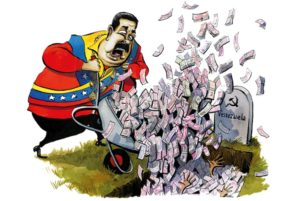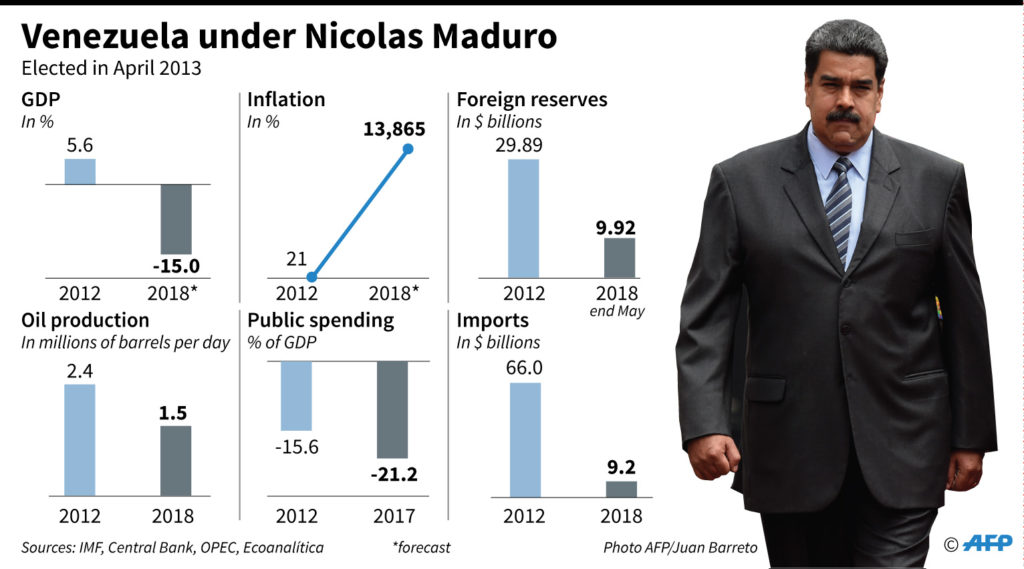
journal of diplomacy
Venezuela has pledged its oil reserves as backing for a digital currency dubbed the “petro,” which leftist President Nicolas Maduro launched in February. This month he vowed it would be the cornerstone of a recovery plan for the crisis-stricken nation. But, a special Reuters report notes…..
It turns out that Venezuela’s petro is hard to spot almost anywhere. Over a period of four months, Reuters spoke with a dozen experts on cryptocurrencies and oil-field valuation, traveled to the site of the pledged oil reserves and scoured the coin’s digital transaction records in an effort to learn more.
Venezuela’s become one giant economic laboratory, its 32 million citizens reduced to guinea pigs, observers suggest. But the regime is showing signs of internal tension and dissension.
 Repression now is being directed not just at opposition forces, but also sectors of the ruling party that are beginning to show discontent, says Javier Corrales of Amherst College.
Repression now is being directed not just at opposition forces, but also sectors of the ruling party that are beginning to show discontent, says Javier Corrales of Amherst College.
“There are reports of about 200 military personnel having been arrested, for example. And that tells us that the government is trying this combination of co-opting some groups, but also applying some force inside the movement itself, including the military,” he tells PBS Newshour.
The regime believes that all they need to do is to wait it out for a few more months, and that at some point the price of oil will go up, and this will give them some more room for maneuvering, adds Corrales, a contributor to the National Endowment for Democracy’s Journal of Democracy So it’s a matter of just holding steady for a little longer, make sure that they don’t introduce drastic change, and wait for the price of oil to go up.

Credit: Spectator
People often wonder why Maduro is still in power if at least 80 percent of the population rejects him, notes Maryhen Jiménez Morales, a doctoral researcher at the University of Oxford. The variables missing are control and repression, she writes for The Globe Post:
These are exerted through brute force, but also through means such as the carnet de la patria, a sort of debit card, designated to the country’s poor by which the government controls who receives food, the now subsidized gas, and most importantly, it can intimidate and mobilize its users whenever it needs to…. Maduro has also proposed to transfer pension funds onto the carnet de la patria. Beyond being against any regulations and laws, this is further humiliating as it conditions pensions to political affiliations.
The only way to guarantee a democratic future for Venezuela is through a peaceful transition, not externally-driven regime change, argues Venezuelan journalist Reynaldo Trombetta. The international community must pressure Maduro into accepting new elections, with a new national electoral council, guaranteed freedoms and transparency, and proper international monitoring, she contends.

Despite the devastating crisis precipitated by the regime, it still has its apologists.
In the UK, views are polarized over Labour Party leader Jeremy Corbyn’s unwavering support for the late Venezuelan president Hugo Chávez and his reluctance to criticize his successor Nicolás Maduro, notes one observer.
Corbyn can now be portrayed “as a two-faced man who claims to be a friend of progressive politics in Latin America but ends up backing a thuggish, misogynist, semi-military ruling clique,” writes former British Labour minister Denis MacShane:
 Professor Mike Gonzalez of Glasgow University wrote a friendly biography of Chavez but now he describes “the systematic undermining of democracy, the demonisation of dissent, the death of trade unionists, the erosion of popular confidence in the government, and the growing violence”. Of those on the Left who “have chosen to say nothing, their silence amounts to complicity with a new ruling class that hides behind the language of socialism”.
Professor Mike Gonzalez of Glasgow University wrote a friendly biography of Chavez but now he describes “the systematic undermining of democracy, the demonisation of dissent, the death of trade unionists, the erosion of popular confidence in the government, and the growing violence”. Of those on the Left who “have chosen to say nothing, their silence amounts to complicity with a new ruling class that hides behind the language of socialism”.
But some academics are still inclined to give Maduro a pass and blame the crisis on the Usual Suspects.
“U.S. strategy defeated the Bolivarian Revolution by forcing Venezuela towards a series of grave miscalculations, overextending the state economically and increasing dependence on oil revenues,” argues Julia Buxton, author of The Failure of Political Reform in Venezuela. “But the legacy of the 2000s, of the Chávez government and the Pink Tide more broadly, is of a new pluralism and a new political consciousness.”







